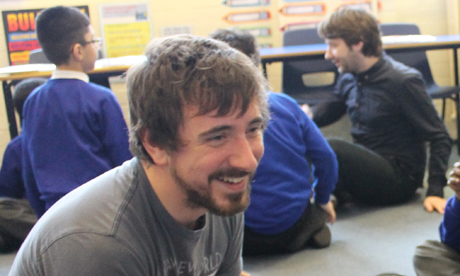Silent Witnesses at Shoreditch Town Hall

Award-winning playwright Ed Harris
A ten-year-old boy shrugs when asked what he felt after witnessing two adults fighting on the street. “Nothing”, he insists, though the more he talks, the more his language gives him away.
“If I felt nothing, is that okay?” he finally asks. For the adults in the room at Shoreditch Town Hall, it is a breakthrough. One of them, Ed Harris, is an award-winning playwright more used to rubbing shoulders with actors than with Year Five pupils.
Harris is in the process of writing a play about – and based on – children’s own experiences of violence.
Its performance, in the spring of 2014, will be the culmination of a project called Silent Witnesses, an 18-month-long collaboration between Theatre Centre and developmental psychologists from Birkbeck University that aims to combat crime using theatre.
Pupils from Mandeville Primary School are among the classes taking part in this nationwide project. Through creative writing workshops and group discussion, the children reflect on violence they may have witnessed in their community, on television or in computer games.
The idea is for Ed Harris to then draw upon the material created in the workshops to create a play which will be performed in schools.
“I think one of the interesting things about this is coming up with a play that is, as much as it is possible, created from the kids’ experiences,” says Harris.
“Essentially, the process is to gain all the information we can and then create something about the kids’ experiences that could be poetic or totally verbatim theatre.
There are still more schools to visit before Harris puts pen to paper, and the magnitude of the task ahead has begun to dawn on him.
“You want it to be about violence, but you don’t want it to be a violent play. You want it to be funny but without humour becoming a distraction,” he muses.
The broader aim of the project, to reduce the risk of children who witness or experience violent crime committing crime themselves, is an ambitious one too. For Harris, the age group chosen (Year 5) is particularly significant in this.
“We’re doing this with them just before they go off to secondary school. In my childhood, when you first turned up at secondary school everyone thought you should have a thick skin already built in,” he reflects.
“That was how a lot of how kids began to fall out and hang around in groups and the playground divided up. Those are really challenging years, so it’s an interesting age to take a snapshot of and it’s a very useful age to start having an open dialogue.”
